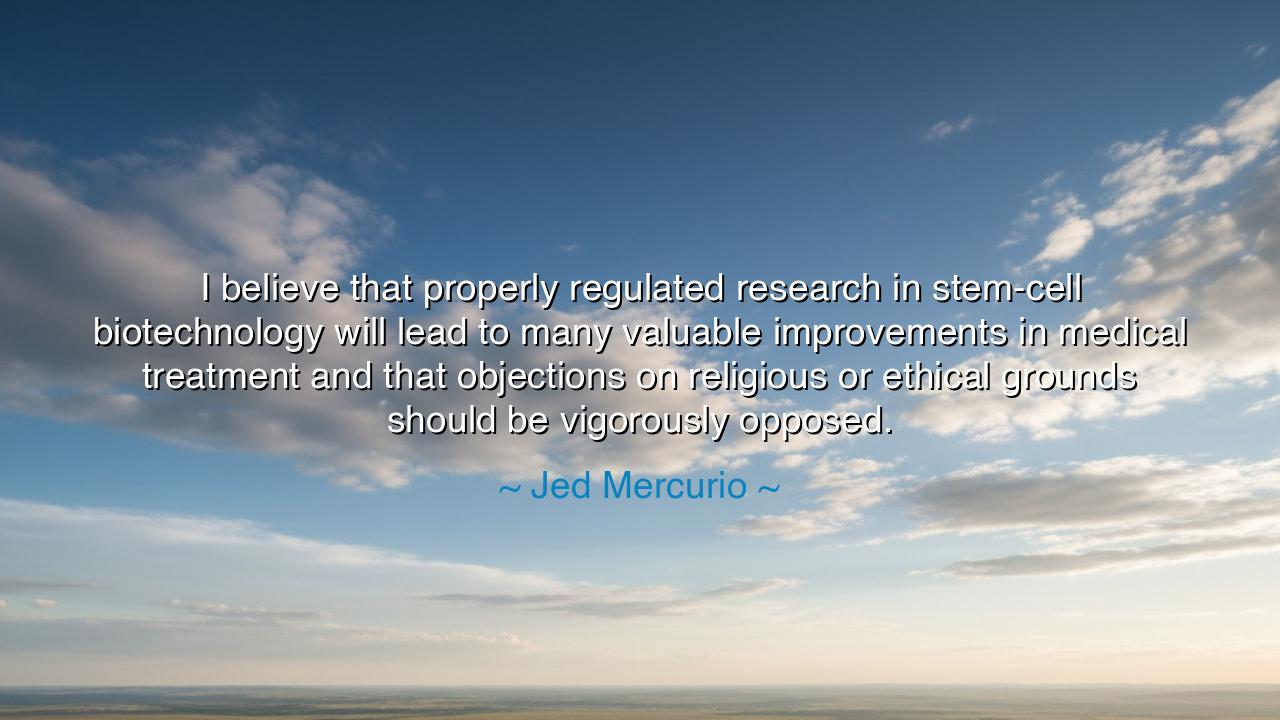
I believe that properly regulated research in stem-cell
I believe that properly regulated research in stem-cell biotechnology will lead to many valuable improvements in medical treatment and that objections on religious or ethical grounds should be vigorously opposed.






The words of Jed Mercurio—“I believe that properly regulated research in stem-cell biotechnology will lead to many valuable improvements in medical treatment and that objections on religious or ethical grounds should be vigorously opposed.”—are not spoken in defiance of faith, but in defense of human progress and compassion. They remind us that moral courage lies not only in reverence for tradition but in the willingness to challenge it when it stands in the way of healing. In his statement, Mercurio calls upon humanity to rise above fear and dogma, to see science not as a rival to morality but as its ally. For what greater act of morality exists than the desire to relieve suffering, to extend life, and to restore the broken body to wholeness?
To understand his conviction, one must know the heart of the issue he speaks to—stem-cell research, one of the most revolutionary and controversial fields in modern medicine. Stem cells hold within them the potential to become any tissue in the body: heart, nerve, bone, or blood. They are the seeds of regeneration, the raw material of life itself. From them, science has already begun to craft new treatments for diseases once deemed incurable—Parkinson’s, diabetes, spinal injuries, and more. Yet despite such promise, this work has been bound and shackled by moral and political debate, often driven by fear rather than understanding. Mercurio’s words are thus both a declaration and a plea: that we must not allow ideology to eclipse compassion, nor permit sacred ignorance to stifle the light of discovery.
The origin of Mercurio’s belief lies in his dual identity as both doctor and storyteller. Before he became known as one of Britain’s great dramatists, he was a physician who walked the corridors of hospitals, witnessing firsthand the limits of medicine. He saw patients die for want of cures that might one day be born from the very science that so many reject. He understood the paradox of the healer’s burden: to care deeply for life while constantly confronting its fragility. It was from this tension that his philosophy emerged—that to protect life, one must also embrace the evolution of knowledge. His words are not born from arrogance, but from empathy—from the heartbreak of watching lives slip away when the means to save them might be within reach, if only humanity dared to look forward.
History itself bears witness to this eternal struggle between progress and prohibition. When Galileo peered through his telescope and saw the moons of Jupiter, the guardians of faith called him heretic. When Edward Jenner introduced the smallpox vaccine, many accused him of violating divine will. Yet in time, what was condemned as blasphemy became recognized as blessing. Mercurio’s statement belongs to this lineage of visionaries who understand that truth and virtue are not enemies, but companions—that science, when guided by conscience, is the highest form of moral duty. The ancients themselves would have seen this as divine—to use knowledge in the service of mercy, to take the gift of reason and wield it for the healing of the world.
In his call to “vigorously oppose” objections on religious or ethical grounds, Mercurio does not advocate disrespect for belief, but the defense of reason against moral stagnation. He reminds us that ethics are not fixed monuments, but living principles that must grow with our understanding. To reject life-saving research in the name of morality is to misunderstand morality itself. The healer who turns away from innovation out of fear of controversy commits a quiet betrayal—the betrayal of those who suffer. The ancients would have called such neglect hubris, for what greater arrogance exists than to deny hope to others while claiming virtue in doing so?
Consider the story of Marie Curie, who faced suspicion and hostility for her work with radioactivity, a force she believed could heal even as it burned. Her research would one day lead to the discovery of radiation therapy, saving countless lives from cancer. Yet she was ostracized and condemned in her time. The pattern repeats: the pioneer suffers so that others may be healed. So too will the scientists of stem-cell research endure resistance, until the day when their work is no longer seen as defiance but as devotion—the devotion to life itself. Mercurio’s words serve as a warning and a promise: that though the path of progress is steep and shadowed by fear, it leads toward light.
From Jed Mercurio’s wisdom, let us take a lesson both scientific and spiritual: that to honor life, we must not worship limitation. True ethics demand action, not paralysis; courage, not conformity. Let every citizen, leader, and thinker remember that compassion must always evolve with knowledge. If we fear progress because it challenges our comfort, we risk turning morality into cruelty, and faith into blindness. The proper path, as Mercurio reminds us, is balance—a regulated, responsible pursuit of discovery, one guided by respect for life and strengthened by the refusal to let ignorance reign.
Thus, his words stand not only as a defense of science but as a declaration of hope. They call us to imagine a future where the lame walk, the blind see, and the dying are reborn through the miracles of knowledge. Let the generations to come remember that this hope was not born from indifference to morality, but from a deeper, wiser morality—the conviction that to heal is sacred, and to hinder healing is sin. For in every age, the true measure of humanity is not in its fear of progress, but in its faith in compassion guided by reason.






AAdministratorAdministrator
Welcome, honored guests. Please leave a comment, we will respond soon